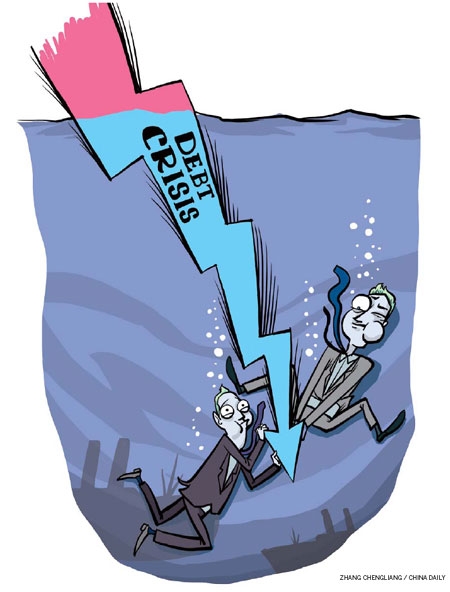Time to get to the root of the problem
By Giles Chance (China Daily European Weekly) Updated: 2011-09-02 10:29Global economic restructuring is needed, and that demands political determination and unity
 |
The new CEO of the International Monetary Fund revealed an unstable economic future for the world during a recent speech.
Christine Lagarde addressed leading economists and central bankers on Aug 27 at the Kansas City Reserve Bank Economic Symposium held in Jackson Hole, Wyoming.
Bankers flock to this annual event to hear speeches by policymakers, as they tend to signal which direction economic policies are headed.
When Lagarde, who leads the organization that advises and supports national central bankers and finance ministers, described the world economy as entering "a dangerous new phase", she implied two things: that she intended to send an important signal, and she wasn't exaggerating.
The previous day, Ben Bernanke, the chairman of the US Federal Reserve, gave a speech against a background chatter of continued high US unemployment and weakening economic growth, which made it a particularly closely watched one.
The markets were hoping that the monetary authority would respond to signs of economic slowing by announcing another round of monetary injections. They were disappointed. Although he did not dismiss the possibility of further monetary assistance, Bernanke emphasized the economy will work out the issues on its own.
He said he was optimistic about the American economy as it is slowly healing from the severe wounds inflicted on it in 2008 by the financial crisis.
Although Bernanke didn't convey the degree of urgency that Lagarde did, both speakers agreed that actions by national central banks are reaching their limits in terms of addressing the world's economic problems.
The fundamental problems are structural. Now it's up to national governments to tackle the excessive debt and under-capitalized banking systems, which explain the chronic instability and weakness of Western economies.
On Aug 24, the cost of insuring against the default of leading European banks, such as BNP Paribas, Royal Bank of Scotland and Deutsche Bank, rose to more than 2 percent (or $200,000 per $10 million) higher than before the beginning of the 2008 crisis. For weeks, the shares of the European banks have been falling. The bans on short selling in France that greeted the signs of real stress failed to recognize the reality of the situation.
Banks have relied heavily on short-term loans from other banks to maintain their liquidity and meet their commitments. The drying up of inter-bank lending in the past week or two shows that European banks are losing trust in each other. They are thinking "if my bank is lying, the others must be lying as well".
In her speech in Wyoming, Lagarde called for re-capitalization of the European banking system, preferably by way of private refinancing, or - if necessary - by the forced injection of public funds.
Lagarde, as the former French minister of finance, should be aware of the true balance sheets of French banks, and so her comments appear particularly significant. For the first time, a major public figure has admitted the true underlying weaknesses in the euro banking system.
Later this month, the German parliament will meet in Berlin to approve a financial assistance package to Greece. This could be the beginning of the endgame in Europe.
If Germany refuses to pass the Greek bailout, the markets will panic, requiring massive emergency measures. This will inevitably involve countries with large financial surpluses, headed by China. Meanwhile one member of the euro system - Finland -backed by Austria, Slovenia and Slovakia, is demanding collateral in return for participation in the Greek loan package.
It's no coincidence that on Aug 25, the French president abruptly ended his trip to a far-flung French colony in the Southwest Pacific to fly to Beijing to meet President Hu Jintao.
President Nicolas Sarkozy announced his China visit as preparation for the G20 summit in November in Cannes. But a more immediate reason for the trip was to ensure continued Chinese financial support for troubled European borrowers, such as Greece, Portugal, Spain and Italy.











